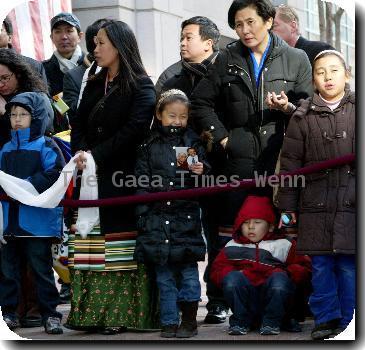Stars of politics, media and fashion talk women’s rights with global activists at NY ’summit’
By Jocelyn Noveck, APSunday, March 14, 2010
NY women’s ’summit’ unites activists worldwide
NEW YORK — A secretary of state. A top presidential adviser. An iconic film star. Fashion designers, TV anchors, and a queen.
Those prominent women and many more crowded into a Manhattan theater this weekend for a conference on empowering women across the globe. But they weren’t the stars of the event.
It was the women’s rights and human rights activists from around the world who drew the cheers, and sometimes tears, at “Women in the World: Stories and Solutions,” a gathering organized by Tina Brown, editor of The Daily Beast Web site, as they talked about how women have progressed and what remains to be done.
Marietou Diarra of Senegal, for example, who spoke to moderator Diane Sawyer at a panel Saturday about the practice of genital cutting that led to the deaths of two of her daughters — one at age 3, one at 7. The 7-year-old was buried by worried relatives before Diarra even knew she’d died.
Tears streaming down her face, Diarra recounted how she saved the lives of her subsequent daughters by spearheading a movement among women in her village and dozens of others to ban the practice. She repeated their slogan: “Let us unite and decide!”
In another panel, Queen Rania of Jordan spoke to Katie Couric about empowering young girls with education, a cause she promotes actively in her own country. “Educating a girl is probably the highest returning investment that a country can make,” she said.
The conference opened Friday evening with remarks by Secretary of State Hillary Rodham Clinton, who brought her daughter, Chelsea, along. The audience watched a clip of Clinton, as first lady, making her famous remarks at the 1995 U.N. women’s conference in Beijing, where she declared that “Women’s rights are human rights.”
Clinton quipped that those remarks came “15 years and many hairstyles ago.” Progress had been made, she joked, on both fronts.
Turning serious, she called progress “undeniable, but insufficient.”
“We must raise our voices even more loudly,” Clinton said. “It’s not just that women’s rights are human rights, but women’s progress is human progress.”
A special reading followed of the play “Seven,” a series of monologues about seven activists across the world, written by seven playwrights and woven together. For this single performance Brown had drafted Oscar-winning actresses Meryl Streep and Marcia Gay Harden, among others; it was directed by Julie Taymor, of “Lion King” fame.
In the audience were six of the seven women on which the play is based. Inez McCormack, a civil rights leader from Northern Ireland, was portrayed by Streep, giving her a sudden prominence in her own country that she wasn’t used to.
She recounted how she’d been working on a better housing campaign for women that had gotten only two lines in the press. “Meryl Streep playing me, I had 15 interviews in one day,” McCormack said. “And I got that housing campaign into 12 of them.”
Getting Streep to participate was easy, Brown said.
“I e-mailed her on a Friday morning, and she replied on Friday evening,” Brown said in an interview. “Like so many others, she said ‘yes’ immediately.”
Brown hopes to make the conference, which was sponsored by HP, Exxon Mobil and Bank of America, an annual event. “When women are empowered it transforms everything,” she said. “It liberates and lifts up an entire community.”
Another highlight of the weekend at Manhattan’s Hudson Theater: An appearance by Valerie Jarrett, one of President Barack Obama’s closest advisers — “the other side of the president’s brain,” as interviewer Lesley Stahl of “60 Minutes” put it.
Jarrett spoke about health care reform, saying the administration is “very confident” that a vote would come in a week or so.
A vigorous defender of her boss and longtime friend, Jarrett responded to criticism of the president’s first year by describing what a huge mess he’d inherited. “It’s unrealistic to expect that it’s going to get turned around in just one year,” she said.
She added, though, that getting the administration’s message out effectively was critical, and on that, “We have to do a better job.”
On a lighter note, Jarrett explained that while she often watches cable TV news — for example, MSNBC’s “Morning Joe” every day — the president does not, and when she talks about it, he tells her: “Turn it off, you’re making me crazy!”
And asked whether she and Michelle Obama “double-team” the president when they want something done, she said they use their power judiciously.
“Michelle and I don’t gang up on him too much, other than maybe what movie we would like to watch — we do tend to bully him on that,” Jarrett said. “But we don’t really conspire. … When the president of the United States listens to you, you’d better be pretty careful about what you recommend.”

